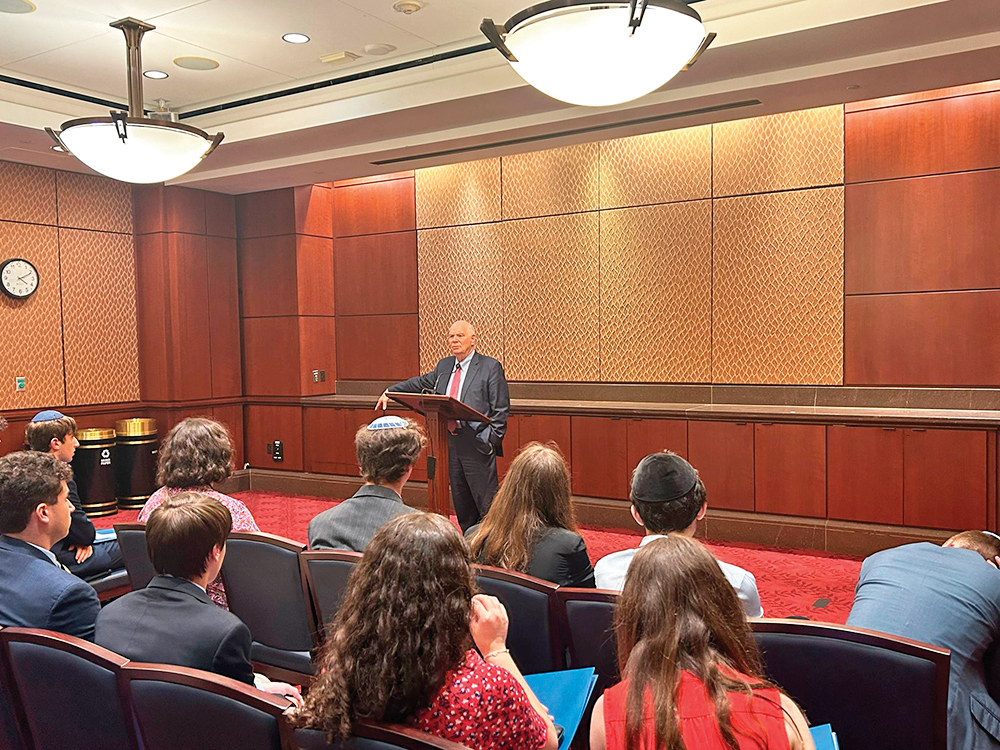
The night had finally arrived … After centuries of persecution and brutal tyranny, the night of our liberation was finally here. Moshe hastily delivered divine instructions for this dramatic evening of independence. To transform this evening into the anniversary of Jewish identity, ceremonies and rituals were necessary. That night in Egypt, the first seder was conducted, and since then, every annual Pesach seder across the globe and across time has recreated that epic night of Jewish nationhood.
In addition to observing rituals such as the Pesach sacrifice, and the unleavened matzo bread, we were also instructed to solicit gold, silver and linens from our Egyptian “friends” and neighbors. Oddly, these essential materials were supplied by our former Egyptian nemeses—rather than directly by Hashem Himself. In a mere few days, Hashem would deliver daily bread from Heaven and would draw sweet drinking water from desert boulders. He could have easily supplied us with gold and silver from supernatural desert quarries or furnished linens from passing desert caravans. Yet, for some reason, on the eve of the great Exodus—despite all the frantic activity—we were expected to solicit these gifts from our Egyptian “friends.”
Enemies Become Audiences
Our relationship with the rank-and-file Egyptian citizenry was undergoing a remarkable transformation. For two centuries, we had been persecuted, dehumanized and depicted as a sub-race of slaves—unworthy of freedom or dignity. After a yearlong cycle of supernatural plagues—punishing Egypt, but completely bypassing the Jewish population—it became clear that we were favored by a Higher Being. Moshe was fast evolving into a national celebrity and Jewish popularity surged. By the night of the actual Exodus, most of the Egyptian population was strongly in favor of releasing the Jewish slaves. Egypt wasn’t being defeated, it was being slowly persuaded.
Education, Not Defeat
Our Exodus from Egypt was more than just a political revolution or an emancipation of slaves. The Exodus was a religious revolution introducing Hashem to the ancient pagan imagination. This night was the grand debut of monotheism in a world darkened by pagan superstition and persecuted by human brutality. Knowledge of Hashem would first spread through Egypt, the cradle of ancient civilization, and, eventually, would circulate throughout the Mediterranean basin. For two centuries, the average Egyptian was a willing accomplice in the heinous crimes of human slavery, but—at this point—they began to appreciate Hashem and respect His chosen people. They weren’t defeated, as much as they were converted.
Requesting gold and clothing from the Egyptians assured that they would be psychologically invested in our journey and in our welfare. By donating these necessities, the Egyptians would view themselves as sponsors of our trip to Israel and as underwriters of our national project. In their minds, our journey would become their journey—allowing our discovery of Hashem to influence their cultural evolution.
Evidently, this tactic was successful as—over the next 900 years—Egypt remained a staunch ally of the Jewish state formed by their former slaves. Shlomo Hamelech married an Egyptian princess, and although his marriage was sharply criticized, it reflected the overall warm diplomatic relations between the two empires. One of the Egyptian Pharaohs donated the large tracts of land he had conquered in Israel, to what would become an immense Jewish palace complex. At the end of the era of the first mikdash, Jews fled to Egypt for safe haven from the raiding Babylonian mercenaries. Beginning with its founding in the third century BCE, Alexandria became a leading Jewish population center, as Egypt—in general—hosted Jewish communities for over 2300 years. On this night, we didn’t just extinguish our enemies, but inspired them to collaborate with us in our great project of human history and religion.
Revenge Is Dark
Soliciting these materials from the Egyptians also assured that the newly-freed slaves wouldn’t commit spiteful crimes of retribution toward their former oppressors. Typically, the overthrow of political systems are violent events, as years of pain and suffering lead to vicious revenge attacks against the previous oppressors. There was a real danger that the night of the Exodus would turn into a bloodbath, as angry slaves rampaged throughout Egypt, butchering lives and looting homes. To preempt retaliatory violence, we were directed to kindly request provisions, rather than violently seizing them. Soliciting gifts prevented darker and more violent forces from emerging.
In fact, Hashem never actually commanded us to solicit these materials, but rather, requested of us to procure these materials. By not imposing His authority upon us, He set an example that we shouldn’t unilaterally impose our newly-attained authority upon the Egyptians. From a legal standpoint, we were owed substantial wages for two centuries of manual labor—yet, these reparations were voluntarily handed over, rather than forcefully confiscated.
It is always preferable to achieve results through joint measures, rather than through unilateral imposition. Furthermore, acting with brute force and without agreement, cultivates aggressive tendencies in our own personalities and corrodes our relationships. It is always tempting to wield power to quickly and effortlessly achieve our goals, but this approach rarely ends well for either party. Agreement is always preferable to force—both in politics and in our personal lives.
Politics of Extinction
Many modern democracies have degenerated into the politics of retaliation. Severe political polarization has eroded the spirit of collaboration, creating a culture of victimhood in which the minority feels aggrieved by the policies of the majority. When the victimized minority ultimately regains power, it quickly abolishes previous policies and unilaterally imposes its own agendas, without securing larger social consensus. Each camp looks to “extinguish” their political enemies, rather than to build unity and accord.
In Israel, we are currently experiencing a wave of retaliatory politics, as a new government, which had felt victimized by the previous one, looks to rapidly reform the judicial system and to overhaul the policies of law enforcement. The current government feels aggrieved by the policies of the past administration, and feels morally justified in unilaterally correcting those injustices and unfair policies.
Without debating the merits or demerits of these new policies, one thing is clear: this form of unilateral imposition erodes social unity. In the short term, it may appear advantageous to the current majority; but in the long term, it is counterproductive—as large sectors of the population feel dispossessed of a sense of shared national enterprise. Sidelining sectors of the population incites anger and invites future cycles of political retaliation. Additionally, people who feel deprived of their voice are unlikely to contribute to the common good of society. In the long term, no one benefits—not even those currently in power.
A Culture of Triumph
Not only do these tactics create social division, but they also set unhealthy examples for individual behavior. What happens in the political arena trickles down to personal behavior. Verbal aggression by politicians will always lead to more hostile and violent social interactions.
Similarly, triumphalism in the political sphere will inspire copycat behavior and the unhealthy use of authority and force in our relationships. Tactics which celebrate the use of power, rather than aiming for consensus will yield a society which respects power rather than honoring cooperation. Societies and communities built upon power are not healthy.
A Bad Image for Religion
Imposing religious policies is particularly corrosive to religion itself. Religious Jews desperately seek a religious society, but legislation of religion can be counterproductive in the long term. There may be certain national “spaces” such as Shabbat, kashrut or marriage, which require legislation to preserve the Jewish nature or identity of our public state. However, widespread imposition of religion can boomerang.
While religious Jews appreciate that serving Hashem enhances the human experience, secular Jews don’t always see it that way. Sadly, religion is widely viewed as restrictive of human freedom and obstructive of individual expression. Religious Jews must demonstrate the beauty and dignity of a life of divine commandment and moral commitment. Imposing religion exacerbates negative associations with religion and poisons public attitudes about religion. Legislation can secure and enrich our own religious experience, but it will not inspire a broad spectrum of the Jewish population toward the beauty of religion.
Ask, don’t tell… It usually is more successful in the long term. So it was in Egypt, and so it has been throughout history.
The writer is a rabbi at Yeshivat Har Etzion/Gush, a hesder yeshiva. He has semicha and a BA in computer science from Yeshiva University as well as a masters degree in English literature from the City University of New York.











